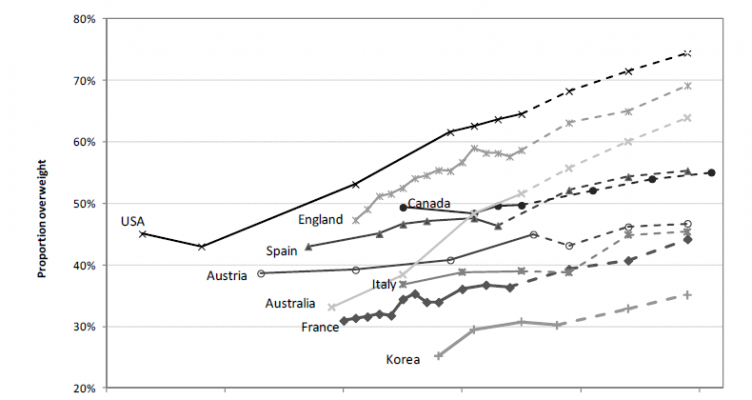Fat Goes Global
 As a percentage of the total population, the United States leads the world in obesity. But other countries are, unfortunately, catching up.
As a percentage of the total population, the United States leads the world in obesity. But other countries are, unfortunately, catching up.
“Fattest man is suing the NHS for ‘letting me grow’” reads the headline in The Sun. The article – which has been heavily covered by blogs and even gained a link on the Drudge Report – describes the terrible struggle of a morbidly obese man.
Obesity is a major problem in the United States, with 3 in 10 Americans being obese, and nearly two thirds of us qualifying as overweight. Our increasing girth is – literally – reshaping our society. (See, for example, this story on the funeral business in Iowa.)
But the obese man in the story isn’t an American. He’s British.
As a percentage of the total population, the United States leads the world with obesity. But other countries are, unfortunately, catching up.
Indeed, just late last year, the OECD released a report on the challenges of obesity across the Western world, with an eye on prevention.
The full report is, obviously, rich in data. But take a look at the graph below (from the report) that details the trends across different nations. The United States is an outlier, but countries like Canada, Australia, and England have their own steep curves, reflecting sharply rising rates of obesity.
The OECD report largely focuses on member nations, but across the world we see the same phenomenon. In China, for example, the overweight (including obese) have doubled as a percentage of the population in a fifteen-year period, from 1991 to 2006, from 13.5% to 26.7%. Obese individuals are a small proportion of that heavy subpopulation, but there is no good news here – the percentage of obese people tripled over the same period of time. Diabetes is now as prevalent in China as it is in the United States, with some 92 million cases.
Look from the world’s largest nation to one of its smallest, but you will see a similar pattern. For an usual take on obesity, consider this Nightline story, cleverly titled The Fattest Place on Earth, on a South Pacific paradise with a big problem.
In a Washington Times article, I consider the globalization of obesity, and its policy implications.
Name a liberal policy cause, and chances are someone has found a way to sell it based on America’s rising obesity rate. Liberal pundits and public-health experts serve up a rich buffet of scapegoats for obesity. Our foods are chemically addictive, they claim, so governments must step in to regulate them. Suburban Americans tend to be more obese, so we need fewer cars and more costly transit options, urbanists insist. Corporate ads, cheap fast food, the lack of Canadian-style health insurance - the list stretches on. Here, though, is the reality. Yes, Americans are getting fatter, but so is everyone else in the industrialized world, and that understanding challenges current wisdom on obesity, suggesting the issue may be more cut and dry than liberals make it out to be.
The full essay can be found here.


